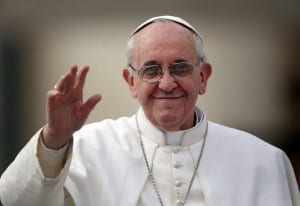 Pope Francis became the leader of the Roman Catholic Church on March 13, 2013. Since that time, he has become one of the more controversial popes in the church’s recent history. In the last 64 years, there have been seven Popes: Pope Pius XII, John XXIII, Paul VI, John Paul I, John Paul II, Benedict XVI, and Francis. For most of us, especially if we were brought up in the Catholic faith, each of these names brings back a memory of how we felt when the predecessor left his position and a new leader took his place.
Pope Francis became the leader of the Roman Catholic Church on March 13, 2013. Since that time, he has become one of the more controversial popes in the church’s recent history. In the last 64 years, there have been seven Popes: Pope Pius XII, John XXIII, Paul VI, John Paul I, John Paul II, Benedict XVI, and Francis. For most of us, especially if we were brought up in the Catholic faith, each of these names brings back a memory of how we felt when the predecessor left his position and a new leader took his place.
Where is Francis from and how did he become the pope?
Pope Francis was born in Buenos Aires, Argentina, on December 17, 1936, as Jorge Mario Bergoglio. He was ordained a priest in 1969, became the Archbishop of Buenos Aires in 1998, and made Cardinal in 2001. After Pope Benedict XVI unexpectedly resigned on February 28, 2013, Bergoglio was elected as his successor on March 13. He chose the name Francis in honor of Saint Francis of Assisi. Francis is the first Jesuit Pope, the first Pope from the Americas, the first Pope from the Southern Hemisphere, and the first non-European Pope since Gregory III, 1273 years ago.
How is Francis different from previous popes?
Comparisons can be drawn between Pope Francis and Pope Innocent III (1198–1216).
Poverty: The church in the spirit of Innocent III meant a church of wealth, pomp, circumstance, acquisitiveness and financial scandal. In contrast, a church in the spirit of Francis means a church of transparent financial policies and modest frugality that concerns itself above all with the poor, the weak, and the marginalized and that does not pile up wealth and capital, but instead actively fights poverty.
Humility: The church in the spirit of Innocent III meant a church of power, domination, bureaucracy, discrimination, repression and the Inquisition. A church in the spirit of Francis means a church of humanity, dialogue and brotherhood.
Simplicity: The church in the time of Innocent III was a church of dogmatic immovability, moralistic censure and legal hedging, a church of canon law regulating everything, a church of all-knowing scholars and of fear. A church in the spirit of Francis means a church of good news and of joy, a theology based purely on the gospel.
Orthodoxy: Francis has stated categorically that he will uphold the traditional views and doctrines of the Roman Catholic Church on all major and central points. Although he strives for reform, he does not want to do this at the expense of orthodoxy.
How is Francis similar to previous popes?
Most of the differences that are seen between Francis and his predecessors are in attitude, approach and relational characteristics. He has carefully avoided many of the trappings of the religious hierarchy in the Church, including donning the traditional mozzetta cape on his election, and wearing simple vestments without ornamentation. Beyond external issues, he has consistently stressed the need for priests and bishops to teach tenderness, mercy, and compassion, and not always focus on the usual issues of condemning abortion, contraception and homosexuality. He truly seems to be about showing grace and compassion for the sinner, without condoning the sin. According to statements he has made, he is in favor of greater accountability and transparency about past abusive practices of the priesthood, which is a break from the past which may have covered up some of these issues instead of bringing them to the light.
How do Catholics feel about Francis?
There are those in the Roman Catholic Church who feel that Francis has gone too far in his efforts to become relational and incarnational. They want the majesty and formal vestments traditionally seen in years past and they want to maintain that in the leadership from the Vatican. But the majority of Catholics seem to believe that Francis is about positive change in the Church.
What do Protestants think about Francis?
Most Evangelicals in the renewal and charismatic movements seem to be in favor of the approach of Francis to the papacy, since they recognize that he is the spiritual leader of the largest Christian church in the world, with 1.2 billion followers. Fundamentalists and ultraconservative Protestants may not see a great difference, since they are opposed to Catholic doctrine per se and do not feel that one man can make an impact. But it is hard to believe that any true follower of Christ, Catholic or Protestant, could be opposed to Francis’s signature efforts to display and model compassion for the poor and marginalized, grace for the sinner, and openness and honesty with regard to previous abuses by the priesthood. Overall it can be said that the large majority of Protestants believe that Francis is a breath of fresh air in the Roman Catholic Church.
Bob Woods is a Senior Project Manager at AECOM Technical Services as well as a published Christian author. He can be reached at [email protected].

Comments